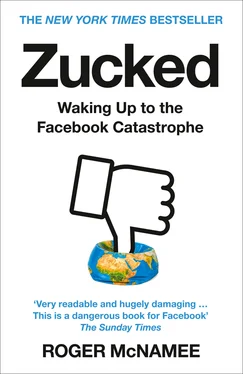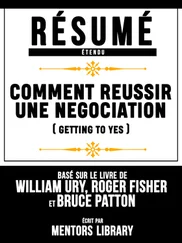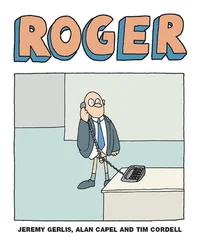The company had plenty of capital when I first met Zuck, so there was no immediate opportunity for me to invest, but as I’ve said, the notion of helping the twenty-two-year-old founder of a game-changing startup deal with an existential crisis really appealed to me. As a longtime technology investor, I received many requests for free help, and I loved doing it. Good advice can be the first step in a lasting relationship and had ultimately led to many of my best investments. The strategy required patience—and a willingness to help lots of companies that might not work out—but it made my work life fresh and fun.
My first impression of Zuck was that he was a classic Silicon Valley nerd. In my book, being a nerd is a good thing, especially for a technology entrepreneur. Nerds are my people. I didn’t know much about Zuck as a person and knew nothing about the episode that nearly led to his expulsion from Harvard until much later. What I saw before me was a particularly intense twenty-two-year-old who took all the time he needed to think before he acted. As painful as that five minutes of silence was for me, it signaled caution, which I took as a positive. The long silence also signaled weak social skills, but that would not have been unusual in a technology founder. But in that first meeting, I was able to help Zuck resolve a serious problem. Not only did he leave my office with the answer he needed, he had a framework for justifying it to the people in his life who wanted their share of one billion dollars. At the time, Zuck was very appreciative. A few days later, he invited me to his office, which was in the heart of Palo Alto, just down the street from the Stanford University campus. The interior walls were covered with graffiti. Professional graffiti. In Zuck’s conference room, we talked about the importance of having a cohesive management team where everyone shared the same goals. Those conversations continued several times a month for three years. Thanks to the Yahoo offer, Zuck understood that he could no longer count on everyone on his team. Some executives had pushed hard to sell the company. Zuck asked for my perspective on team building, which I was able to provide in the course of our conversations. A year later, he upgraded several positions, most notably his chief operating officer and his chief financial officer.
Toward the end of 2006, Zuck learned that a magazine for Harvard alumni was planning a story about the Winklevoss brothers and again turned to me for help. I introduced him to a crisis-management public relations firm and helped him minimize the fallout from the story.
I trust my instincts about people. My instincts are far from perfect, but they have been good enough to enable a long career. Intensity of the kind I saw in Zuck is a huge positive in an entrepreneur. Another critical issue for me is a person’s value system. In my interactions with him, Zuck was consistently mature and responsible. He seemed remarkably grown-up for his age. He was idealistic, convinced that Facebook could bring people together. He was comfortable working with women, which is not common among Silicon Valley entrepreneurs. My meetings with Zuck almost always occurred in his office, generally just the two of us, so I had an incomplete picture of the man, but he was always straight with me. I liked Zuck. I liked his team. I was a fan of Facebook.
This is a roundabout way of saying that my relationship with Zuck was all business. I was one of the people he would call on when confronted with new or challenging issues. Mentoring is fun for me, and Zuck could not have been a better mentee. We talked about stuff that was important to Zuck, where I had useful experience. More often than not, he acted on my counsel.
Zuck had other mentors, several of whom played a much larger role than I did. He spoke to me about Peter Thiel, who was an early investor and board member. I don’t know how often Zuck spoke with Thiel, but I know he took Peter’s advice very seriously. Philosophically, Thiel and I are polar opposites, and I respected Zuck for being able to work with both of us. Washington Post CEO Don Graham had started advising Zuck at least a year before me. As one of the best-connected people in our nation’s capital, Don would have been a tremendous asset to Zuck as Facebook grew to global scale. Marc Andreessen, the Netscape founder turned venture capitalist, played a very important role in Zuck’s orbit, as he was a hard-core technologist who had once been a very young entrepreneur. Presumably, Zuck also leaned on Jim Breyer, the partner from Accel who made the first institutional investment in Facebook, but Zuck did not talk about Breyer the way he did about Thiel.
In researching this book for key moments in the history of Facebook, one that stands out occurred months before I got involved. In the fall of 2005, Facebook gave users the ability to upload photographs. They did it with a new wrinkle—tagging the people in the photo—that helped to define Facebook’s approach to engagement. Tagging proved to be a technology with persuasive power, as users felt obligated to react or reciprocate when informed they had been tagged. A few months after my first meeting with Zuck, Facebook made two huge changes: it launched News Feed, and it opened itself up to anyone over the age of thirteen with a valid email address. News Feed is the heart of the Facebook user experience, and it is hard today to imagine that the site did well for a couple of years without it. Then, in January 2007, Facebook introduced a mobile web product to leverage the widespread adoption of smartphones. The desktop interface also made a big leap.
In the summer of 2007, Zuck called to offer me an opportunity to invest. He actually offered me a choice: invest or join the board. Given my profession and our relationship, the choice was easy. I did not need to be on the board to advise Zuck. The investment itself was complicated. One of Facebook’s early employees needed to sell a piece of his stake, but under the company’s equity-incentive plan there was no easy way to do this. We worked with Facebook to create a structure that balanced both our needs and those of the seller. When the deal was done, there was no way to sell our shares until after an initial public offering. Bono, Marc, and I were committed for the long haul.
Later that year, Microsoft bought 1.6 percent of Facebook for $240 million, a transaction that valued the company at $15 billion. The transaction was tied to a deal where Microsoft would sell advertising for Facebook. Microsoft paid a huge premium to the price we paid, reflecting its status as a software giant with no ability to compete in social. Facebook understood that it had leverage over Microsoft and priced the shares accordingly. As investors, we knew the Microsoft valuation did not reflect the actual worth of Facebook. It was a “strategic investment” designed to give Microsoft a leg up over Google and other giants.
Soon thereafter, Facebook launched Beacon, a system that gathered data about user activity on external websites to improve Facebook ad targeting and to enable users to share news about their purchases. When a Facebook user interacted with a Beacon partner website, the data would be sent to Facebook and reflected in the user’s News Feed. Beacon was designed to make Facebook advertising much more valuable, and Facebook hoped that users would be happy to share their interests and purchase activities with friends. Unfortunately, Facebook did not give users any warning and did not give them any ability to control Beacon. Their activities on the web would appear in their Facebook feed even when the user was not on Facebook. Imagine having “Just looked at sex toys on Amazon.com” show up in your feed. Users thought Beacon was creepy. Most users did not know what Facebook was doing with Beacon. When they found out, they were not happy. Zuck’s cavalier attitude toward user privacy, evident from the first day of Facemash back at Harvard, had blown up in his face. MoveOn organized a protest campaign, arguing that Facebook should not publish user activity off the site without explicit permission. Users filed class action lawsuits. Beacon was withdrawn less than a year after launch.
Читать дальше






